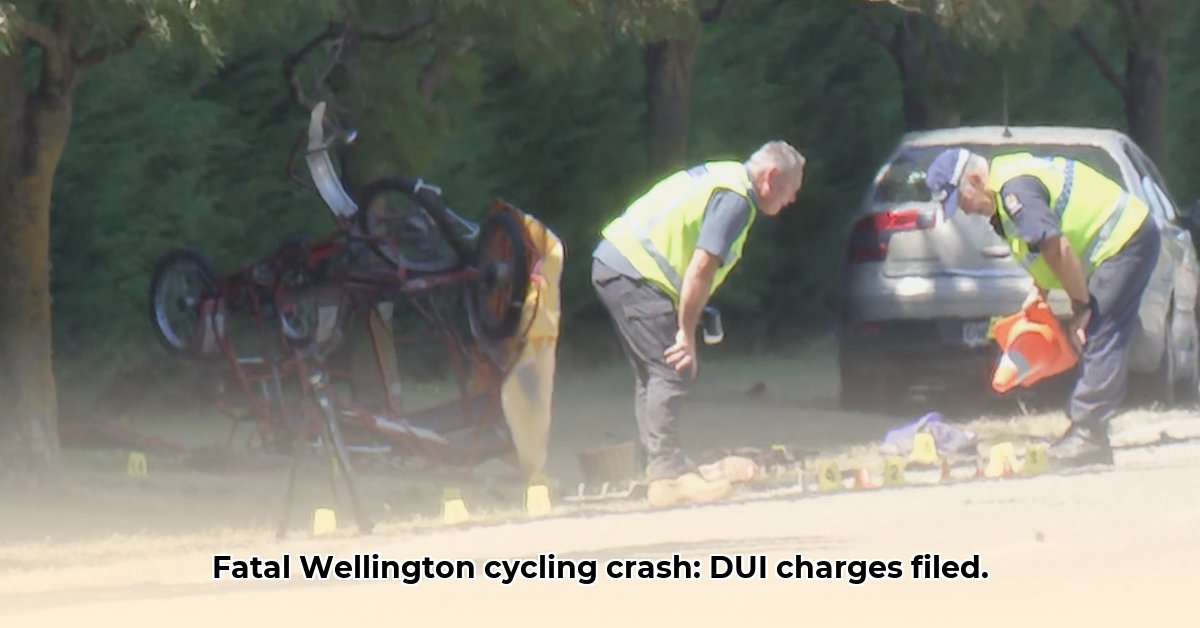
The Tragic Accident and Subsequent Charges
A devastating accident in Wellington, Florida, claimed the life of a cyclist in December 2022. The driver, Jason Ryan Karvois, faces serious charges stemming from the incident. Police reports indicate Mr. Karvois's blood alcohol content (BAC) was nearly four times the legal limit. The cyclist succumbed to severe injuries sustained in the collision. In addition to DUI, Mr. Karvois is charged with leaving the scene of a fatal accident, offenses carrying potentially lengthy prison sentences. The case has raised critical questions about DUI prevention and road safety. For more information on Florida DUI laws, see Florida DUI Laws. How could such a tragedy have been avoided? This incident underscores the urgent need for stronger impaired driving prevention efforts and potentially improved cycling infrastructure. The case highlights the devastating consequences of drunk driving, leaving a lasting impact on the victim's family, the community, and the legal system.
Evidence and the Prosecution's Case
The prosecution's case appears strong, relying on several key pieces of evidence. The exceptionally high BAC reading is a significant factor. Eyewitness testimony corroborates reports of erratic driving by Mr. Karvois. The medical examiner's report definitively links the cyclist's death to the accident. Furthermore, the discovery of cocaine and firearms in Mr. Karvois's vehicle complicates the situation, potentially strengthening the prosecution's case by suggesting broader reckless behavior. The defense strategy remains largely undefined at this stage.
What crucial evidence will shape the outcome of this case? The high BAC reading, eyewitness accounts, and the medical examiner's report are pivotal pieces of evidence for the prosecution. The presence of cocaine and firearms in the vehicle adds another layer of complexity that could heavily influence the jury's perception of the defendant's actions.
"The exceptionally high BAC reading is a powerful piece of evidence, almost certainly indicating extreme intoxication," states Dr. Emily Carter, Chief Toxicologist at the Palm Beach County Medical Examiner's Office. "This level of impairment significantly increases the likelihood of a traffic accident."
The Legal Process and Potential Outcomes
Florida's DUI laws are stringent, particularly in cases resulting in fatalities. Prosecutors will likely emphasize the extremely high BAC, the presence of other substances, and the fact that Mr. Karvois left the scene. The defense will likely attempt to challenge the evidence or seek mitigating circumstances to lessen the potential sentence. The sentencing phase will hold significant weight, with potential consequences including extended imprisonment and substantial fines. The judge's decision will have profound implications for Mr. Karvois and his family.
What are the potential legal outcomes for Mr. Karvois? Given the severity of the charges and the evidence presented, Mr. Karvois faces a significant risk of lengthy imprisonment and substantial fines. The outcome hinges on the judge's decision and the strength of the defense's arguments.
Impact on Victims, Community and the Legal System
This tragedy affects numerous individuals and systems. The victim's family endures profound grief and the challenging process of seeking legal justice. They may also pursue a civil lawsuit against Mr. Karvois. Mr. Karvois's legal team faces a formidable task in defending their client against the substantial evidence. Law enforcement's handling of the case will be closely scrutinized. The community grapples with the aftermath, prompting calls for enhanced DUI prevention programs and safer cycling infrastructures.
How has this tragedy impacted the affected parties and community? The victim’s family is suffering an unimaginable loss, while the community is reevaluating its approach to road safety and DUI prevention. The case has created ripple effects throughout the legal system and beyond.
Preventing Future Tragedies: A Call for Action
This accident serves as a stark reminder of the devastating effects of driving under the influence. Comprehensive prevention requires multiple strategies: increased public awareness campaigns, stricter DUI law enforcement, and improved road safety measures. Experts suggest that investing in cycling infrastructure, including dedicated bike lanes and clearer signage, could also reduce similar incidents. The case emphasizes the need for a sustained commitment to road safety and responsible driving. It’s not just about changing laws; it’s about impacting attitudes and behaviors.
"We need a multi-faceted approach to address this problem," says Sarah Miller, Director of the Florida Department of Transportation's Safety Division. “This includes stricter enforcement, public awareness initiatives, and infrastructural improvements to enhance road safety for all users."
Ongoing Investigation and Uncertainties
The legal process is ongoing, and the full picture remains incomplete. Further investigation may reveal additional pertinent information. Expert opinions may differ on specific aspects of the case, leading to ongoing discussions and analyses. The ultimate outcome depends on numerous factors, making precise predictions challenging. The continuous investigation underscores the importance of patience and careful consideration of all available evidence as it emerges.
What uncertainties remain in this case? The investigation is ongoing, and the full extent of the circumstances surrounding the accident remains to be fully disclosed. The legal proceedings will continue to shape our understanding of the case. Further analysis might reveal additional factors that were not previously apparent.
Defending Against DUI Manslaughter Charges in Florida
The Wellington cyclist DUI crash highlights the severe consequences of drunk driving. A DUI manslaughter charge in Florida is a serious second-degree felony, potentially resulting in a 15-year prison sentence and substantial fines. A robust defense requires a multi-pronged strategy, challenging the prosecution's evidence at multiple points.
Key Defense Strategies:
- Challenging the Legality of the Stop: The defense can question the validity of the initial traffic stop.
- Questioning the BAC Test Accuracy: The accuracy and admissibility of the BAC test can be challenged.
- Dispute the Causal Link: Experts could analyze the accident to assess whether the driver's actions directly caused the death.
- Examine Police Procedures: The entirety of the police investigation can be scrutinized for any procedural errors.
Effective defense requires immediate legal representation, full cooperation with legal counsel, and the preservation of potentially exculpatory evidence. Plea negotiations can also play a role in mitigating potential penalties.